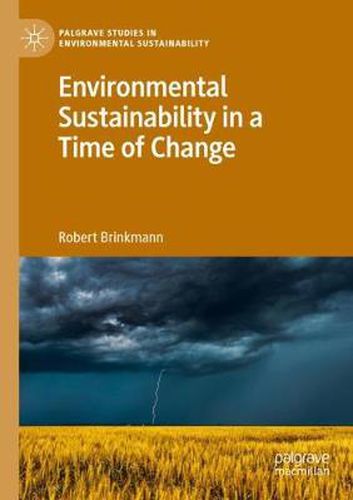Readings Newsletter
Become a Readings Member to make your shopping experience even easier.
Sign in or sign up for free!
You’re not far away from qualifying for FREE standard shipping within Australia
You’ve qualified for FREE standard shipping within Australia
The cart is loading…






This title is printed to order. This book may have been self-published. If so, we cannot guarantee the quality of the content. In the main most books will have gone through the editing process however some may not. We therefore suggest that you be aware of this before ordering this book. If in doubt check either the author or publisher’s details as we are unable to accept any returns unless they are faulty. Please contact us if you have any questions.
Environmental Sustainability in a Time of Change is the first book in a new Palgrave series on Environmental Sustainability. It takes a fresh look at the dynamic field of environmental sustainability by exploring the interconnections between climate change, water, energy, waste, land use, ecosystems, food, and transportation. It also provides an extensive summary on sustainability management, data analysis, mapping, and data sources. Brinkmann highlights how environmental sustainability challenges are distinctly different in the developed world, where sustainability is largely a choice, versus the developing world, where many struggle with basic existence due to war, migration, and water or food scarcity. He takes a broad systems and historic approach to contextualize environmental sustainability prior to the 1987 Brundtland Report and utilizes many contemporary examples throughout the text, analyzing numerous case studies from many areas of the world including China, Yemen, Malaysia, Egypt, and Florida.
This book questions traditional approaches to sustainability that highlight the need for an equal balance of economic development, environmental protection, and social equality to achieve sustainability. This book focuses on a new line of thinking that places environmental sustainability as the key foundation in how to manage sustainability in a time of change. Our planet is quickly becoming environmentally unsustainable due to global consumption and unsustainable economic development and it is high time for a fresh approach. This book will be of great value to academics, practitioners, and students interested in environmental sustainability from a myriad of fields including geology, geography, biology, ecology, economics, business, sociology, anthropology, and other areas that intersect the interdisciplinary field of sustainability.
$9.00 standard shipping within Australia
FREE standard shipping within Australia for orders over $100.00
Express & International shipping calculated at checkout
This title is printed to order. This book may have been self-published. If so, we cannot guarantee the quality of the content. In the main most books will have gone through the editing process however some may not. We therefore suggest that you be aware of this before ordering this book. If in doubt check either the author or publisher’s details as we are unable to accept any returns unless they are faulty. Please contact us if you have any questions.
Environmental Sustainability in a Time of Change is the first book in a new Palgrave series on Environmental Sustainability. It takes a fresh look at the dynamic field of environmental sustainability by exploring the interconnections between climate change, water, energy, waste, land use, ecosystems, food, and transportation. It also provides an extensive summary on sustainability management, data analysis, mapping, and data sources. Brinkmann highlights how environmental sustainability challenges are distinctly different in the developed world, where sustainability is largely a choice, versus the developing world, where many struggle with basic existence due to war, migration, and water or food scarcity. He takes a broad systems and historic approach to contextualize environmental sustainability prior to the 1987 Brundtland Report and utilizes many contemporary examples throughout the text, analyzing numerous case studies from many areas of the world including China, Yemen, Malaysia, Egypt, and Florida.
This book questions traditional approaches to sustainability that highlight the need for an equal balance of economic development, environmental protection, and social equality to achieve sustainability. This book focuses on a new line of thinking that places environmental sustainability as the key foundation in how to manage sustainability in a time of change. Our planet is quickly becoming environmentally unsustainable due to global consumption and unsustainable economic development and it is high time for a fresh approach. This book will be of great value to academics, practitioners, and students interested in environmental sustainability from a myriad of fields including geology, geography, biology, ecology, economics, business, sociology, anthropology, and other areas that intersect the interdisciplinary field of sustainability.